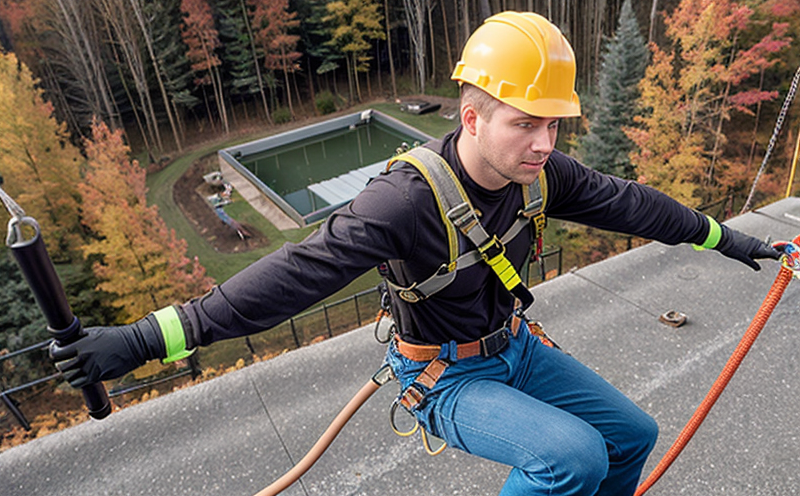ASTM F2078 Suspension Harness Pressure Distribution Testing
The ASTM F2078 standard outlines the requirements and methods for testing suspension harnesses used in fall protection systems. This test is crucial as it ensures that the harness distributes pressure evenly across the wearer's body, thereby minimizing the risk of injuries during a fall. The primary objective is to verify that the harness can withstand the specified loads without causing discomfort or injury.
The testing procedure involves several critical steps which are detailed in ASTM F2078. A specially designed test apparatus simulates real-world conditions by applying a series of incremental loads to the harness. These loads mimic the forces experienced during a fall, providing valuable insights into how the harness performs under stress.
Before commencing the tests, careful preparation of the harness is essential. This includes ensuring that all components are clean and free from any defects or damage. The harness must be adjusted according to manufacturer specifications to ensure accurate testing results.
The test apparatus used in ASTM F2078 is designed to apply a series of loads, typically ranging from 150 lbs to 300 lbs, incrementally at specified intervals. These loads are applied to different parts of the harness to evaluate its overall performance and safety. The apparatus records both force and displacement data during these load applications.
The test results are analyzed meticulously to ensure that they meet or exceed the requirements set forth in ASTM F2078. Key parameters include maximum force, pressure distribution, and any signs of deformation or failure under the applied loads. Compliance with these standards is crucial for maintaining worker safety and ensuring regulatory compliance.
It is important to note that ASTM F2078 is not just about testing harnesses in isolation; it also emphasizes the importance of integrating fall protection systems into overall workplace safety programs. This includes proper training, regular inspection, and maintenance of equipment used in such systems.
The results from ASTM F2078 testing are invaluable for quality managers, compliance officers, R&D engineers, and procurement teams responsible for ensuring that fall protection systems meet industry standards. By adhering to these tests, organizations can significantly reduce the risk of occupational injuries associated with falls from heights.
Industry Applications
- Construction Sites: Suspension harnesses are a critical component in protecting workers on construction sites where there is a high risk of falls. ASTM F2078 ensures that these harnesses perform reliably under the stress of real-world scenarios.
- Manufacturing Plants: Workers in manufacturing environments may need to access elevated areas frequently. Properly tested suspension harnesses help maintain safety standards even in dynamic workspaces.
- Utility Companies: Lineworkers and other utility personnel often work at heights, making ASTM F2078 testing essential for ensuring the durability and comfort of their fall protection equipment.
- Hazardous Environments: In sectors where workers are exposed to hazardous conditions, reliable fall protection is paramount. Suspension harnesses tested according to ASTM F2078 provide an additional layer of safety in such environments.
The application of these standards extends beyond just the equipment itself; it includes the entire system designed to protect workers from falls. By adhering to ASTM F2078, companies can ensure that their fall protection systems are not only effective but also comply with international best practices.
Quality and Reliability Assurance
The quality and reliability of suspension harnesses are paramount in ensuring worker safety. ASTM F2078 provides a robust framework for testing these critical components, which helps manufacturers maintain high standards of product integrity.
The testing process is designed to identify any potential weaknesses or defects that could compromise the harness's performance during use. By subjecting the harness to various loads and observing its behavior under stress, testers can pinpoint areas needing improvement. This ensures that only reliable products reach the market, further enhancing overall safety for end-users.
Regular inspections and periodic retesting are also recommended as part of a comprehensive quality assurance program. These practices help maintain consistency in product performance over time, ensuring continued reliability even after extended use.
In addition to testing individual components like suspension harnesses, it is equally important to evaluate the entire fall protection system. This holistic approach ensures that all elements work together harmoniously, providing maximum protection to workers operating at heights.
By implementing rigorous quality control measures and leveraging tests such as those outlined in ASTM F2078, companies can build trust with their customers while also safeguarding the wellbeing of their employees. Compliance with these standards demonstrates a commitment to excellence and sets benchmarks for industry leaders.
Competitive Advantage and Market Impact
Adhering to ASTM F2078 suspension harness pressure distribution testing can provide significant competitive advantages in the market. In an increasingly safety-conscious world, demonstrating compliance with recognized standards like this one can set a company apart from competitors who may not prioritize such measures.
Clients and stakeholders are more likely to trust organizations that demonstrate their dedication to worker safety through rigorous testing protocols. This trust translates into better client relationships and stronger brand loyalty, which are key factors in sustaining long-term success.
Moreover, companies that consistently meet or exceed these standards may find themselves at the forefront of innovation within their respective industries. By staying ahead of regulatory changes and industry trends, they can introduce new products and services more effectively than those lagging behind.
The results from ASTM F2078 testing also contribute to broader market impacts by influencing policy decisions and influencing safety standards worldwide. As more companies adopt these practices, the overall level of worker protection improves across various sectors, fostering safer working environments globally.





